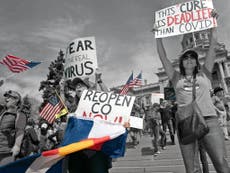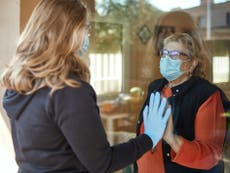Coronavirus: Test NHS staff twice a week to restore patients’ trust, says top surgeon
‘Absolutely essential’ to reassure public over hospital safety, says president of Royal College of Surgeons
NHS employees should be tested for coronavirus twice a week to help reassure patients that staff are not infected, a leading surgeon has said.
Professor Derek Alderson, president of the Royal College of Surgeons, said it was necessary to increase staff testing to encourage people who have stayed away from hospitals during the pandemic that it was safe to return.
“It’s absolutely essential to regain public confidence that we are able to test our staff regularly,” he told the House of Commons’ health and social care select committee.
Prof Alderson said it would now be “pragmatic” for staff to get tests “about twice weekly” – since research indicates some tests produced false negatives.
Anywhere between two and 29 per cent of coronavirus infections may not be picked up from a single swab test, according to recent report by researchers at the University of Bristol.
“There is adequate [testing] capacity, it just needs to be directed to those who need it most,” Prof Alderson added.
As concern grows about the number of patients waiting for delayed NHS treatment, Prof Alderson told MPs that catching up on a backlog of cancelled surgeries could take “years”.
He said: “I think that dealing with the backlog is not something that’s achievable simply in weeks, you know, we stopped for 12 weeks so we can catch up in 12 weeks... This is certainly many months, it may take us a few years to catch up, and as I say we have to be able to sustain that effort.
“So we really do need a programme [of] recovery of surgery and the sustainability of surgery that probably looks at four or five years in order to have a resilient system and take things forward in the best possible way.”
He told the committee that “Covid-light” sites could be created, where there is a minimal risk of catching the virus for patients requiring planned surgery.

Meanwhile, the president of the Royal College of Emergency Medicine said appointments in A&E departments could become a permanent measure to prevent overcrowding following the coronavirus crisis.
Dr Katherine Henderson told MPs that emergency wards were used to having “elastic walls” and an “infinite number of patients”.
But she warned often those who require emergency treatment are among the most vulnerable, and at increased risk if they contract Covid-19.
“If we cannot have space to put those patients, we are going to cause enormous problems and harm to patients,” she said.
“And so we need to be able to have some way of stopping those elastic walls and actually having some way of knowing who is coming, and making sure that the right patients are coming to the emergency department.”
To stop A&E units becoming overwhelmed, Dr Henderson told MPs that NHS 111, which has seen an increased input from clinicians during the pandemic, could be used as an initial contact point.
She said that patients could then be offered booked appointments into urgent treatment centres and “hot clinics”, where those with known health problems could be directed to a specialist.
Additional reporting by PA
Subscribe to Independent Premium to bookmark this article
Want to bookmark your favourite articles and stories to read or reference later? Start your Independent Premium subscription today.








Join our commenting forum
Join thought-provoking conversations, follow other Independent readers and see their replies
Comments